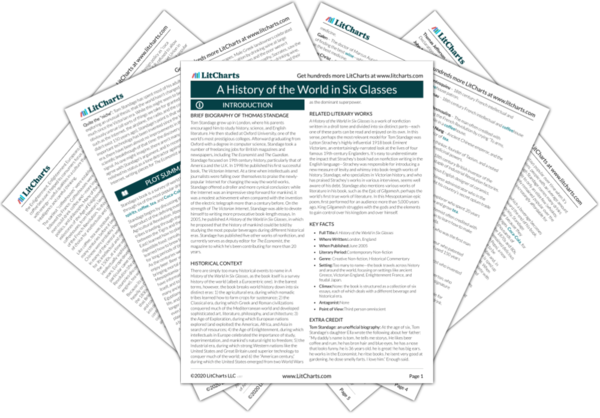Summary
Analysis
In the 1600s, a powerful new intellectual movement began in Europe: the Enlightenment. Figures like Galileo and Francis Bacon stressed the importance of experimentation, empiricism, and careful observation, rather than a blind reliance on accepted truths. Standage argues that the rise of the European Enlightenment was closely paralleled by the rise of coffee in Europe among middle-class workers and intellectuals around the same time.
The association between the Enlightenment and coffee has been studied for a long time (Standage even cites 19th-century historians who echo his conclusions). In many ways, Standage’s argument in the following chapters is clearer and more concise than the previous chapters. Coffee is a more specific drink than “spirits” (spirits can mean anything from rum to bourbon to mescal, and therefore meant many different things to many different people), and also Standage also seems more comfortable writing about his areas of expertise—that is, British and American history, and particularly their economics.
Themes
At the beginning of the Age of Enlightenment, Standage argues, “Europe began to emerge from an alcoholic haze that had lasted for centuries.” Coffee, a drink that became popular in Europe in the middle of the 17th century, was praised for inspiring a sense of clarity and conversation—exactly the opposite of the feeling that alcohol inspired in its drinkers.
All of the drinks that Standage writes about cause psychosomatic changes in their consumers. While alcohol is essentially a depressant, coffee is a stimulant—it creates energy, vigor, etc. In this way, coffee became an apt symbol of the new optimism of the Enlightenment.
Themes
Europe borrowed coffee from the Arab world. Coffee was probably invented in North Africa, or possibly Yemen. According to legend, a goatherd noticed that his goats became energetic after eating a mysterious brown bean. The goatherd took the beans to a local holy man, who discovered how to convert the beans into a strong, dark drink. Whether or not the legend is true, coffee quickly became popular throughout the Middle East. Coffee was especially popular because Muslims weren’t permitted to drink alcohol. Coffeehouses were well patronized in Muslim countries, to the point where many Muslim scholars tried to argue that coffee was an intoxicating brew—no better than alcohol. Yet other Muslim scholars argued that coffee brought its drinkers closer to Allah (God).
Standage is writing a history of the world, but at the end of the day the majority of his evidence comes from European history. While he explores the origins of coffee in the Middle Eastern world, he doesn’t spend much time on this portion of history—in his mind, the story of coffee really kicks off when Europeans begin drinking in the Age of Enlightenment. Of course, Standage’s book isn’t very long, so he has to cut out many things, but it’s also important to keep in mind that he’s writing “world” history from a conspicuously European perspective.
Themes
At first, the Christian world rejected coffee and viewed it as a pagan, Muslim drink. But in the early 1600s, Pope Clement VIII changed the popular thinking on coffee by claiming that it was a delicious beverage. Inspired by the Pope’s example, coffee spread throughout Europe, pushed on by the strength of Arabic trading networks.
Although Europe began by dismissing its rival’s prized beverage, it then switched to embracing this beverage. After this, coffee (for Standage, at least) became a distinctly European drink.
Themes
Get the entire Six Glasses LitChart as a printable PDF.

Coffeehouses first appeared in England during the time of Oliver Cromwell, the Puritan dictator of England. Because Cromwell discouraged the consumption of alcohol, coffee was celebrated as a viable alternative to alcohol—not sinful, but still delicious, bitter, and somewhat intoxicating. The first “coffeehouse” in England was tended by Pasqua Rosee, an Armenian servant who’d tasted coffee during his travels through the Middle East. Rosee worked for Daniel Edwards, a wealthy merchant who would invite his friends to discuss politics and religion in the building. The establishment was so successful that many other coffeehouses opened in London—within half a century there were at least 3,000.
Many of the drinks in Standage’s book became popular because they were an alternative to another drink that had become unpopular for cultural reasons (whiskey was an alternative to wine in America, for example). The popularization of a drink isn’t only a matter of discovering a new brewing process—drinks “replace” one another for cultural reasons that have nothing to do with science or technology.
Themes
Within less than a century, coffeehouses had become a central part of social and political life in England. While some disapproved of coffeehouses for provoking intoxication (the effects of coffee on the nervous system weren’t well understood at the time), triviality, and time-wasting, for the most part men enjoyed coffeehouses immensely.
The coffeehouse is one of the best examples of a drinking space—a place where a certain group gathers and celebrates its cultural identity by drinking together. Coffee, with its effects of focus and concentration, was also an apt inspiration for the intellectuals of the Enlightenment.
Themes
Through the 17th and 18th centuries, Arabia was the only supplier of coffee beans for England. This changed as England, along with Holland and France, became an imperial power. Holland established coffee plantations in its new colonies in Java (a name still associated with coffee), and later France and England established similar plantations, so that Arabia was no longer necessary to provide Europe with its coffee. European colonists spread coffee to Brazil, Suriname, Guatemala, Santo Domingo, and dozens of other colonies in the New World.
In addition to being an appropriate symbol for Enlightenment values, coffee also became a rather poignant symbol of European imperialism during the modern era. Because of the Europeans’ desire for coffee, entire ecosystems and societies in Java and Indonesia were altered. As with sugarcane and rum, the popularity of coffee also fueled the slave trade, as free labor was required to keep these drinks cheap.
Themes












